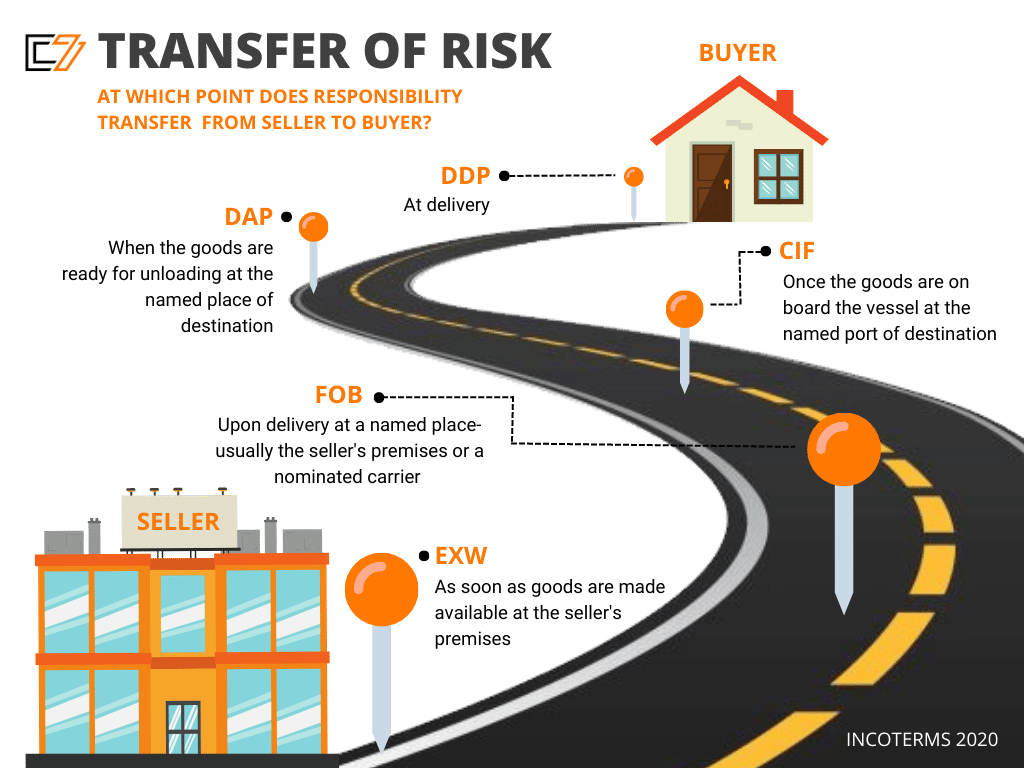Get it wrong, however, and you may be facing some hefty consequences. Miscommunication, unexpected financial burdens, costly legal proceedings, compliance issues, and inadequate insurance coverage are just some of the things you'll want to avoid.
What are the most commonly used Incoterms and when to use them?
The most commonly used Incoterms in international trade vary depending on the specific circumstances and preferences of the parties involved. However, some of the most commonly used Incoterms are:
EXW (Ex Works)
This term is often used when the buyer wants to take control of the entire shipping process and is responsible for arranging transportation.
FOB (Free on Board)
It is frequently used in maritime trade, especially when the buyer wants to have control over the shipping process after the goods are loaded onto the vessel.
CIF (Cost, Insurance, and Freight)
This term is commonly used when the seller wants to arrange transportation and provide insurance coverage for the goods during transit.
DAP (Delivered at Place)
It is commonly used when the seller wants to deliver the goods to a specific place of destination, and the buyer assumes responsibility for customs clearance and any further transportation.
DDP (Delivered Duty Paid)
This term is often used when the seller wants to take full responsibility for delivering the goods to the buyer's location, including clearing customs and paying any applicable duties.
Here’s the complete list of the Incoterms 2020
Ready to learn it all? Here’s a list of the current Incoterms, which are internationally recognized commercial terms used for shipping:
-
EXW (Ex Works): The seller's responsibility ends when the goods are made available at their premises, and the buyer assumes all subsequent transportation costs and risks.
-
FCA (Free Carrier): The seller is responsible for delivering the goods to a named place, usually their premises or a nominated carrier. The buyer is responsible for the main transportation costs and risks from that point.
-
CPT (Carriage Paid To): The seller bears the costs of transportation to the named place of destination, but the risk transfers to the buyer once the goods are handed over to the carrier.
-
CIP (Carriage and Insurance Paid To): Similar to CPT, the seller pays for transportation to the named place of destination and also provides insurance against the buyer's risk of loss or damage during transit.
-
DAP (Delivered at Place): The seller is responsible for delivering the goods to the buyer at a named place of destination. The seller bears the costs and risks until the goods are ready for unloading.
-
DPU (Delivered at Place Unloaded): The seller is responsible for delivering the goods, unloading them at the named place of destination, and assumes the risks until the unloading is complete.
-
DDP (Delivered Duty Paid): The seller is responsible for delivering the goods to the buyer at the named place of destination, cleared for import and with duties paid. The seller assumes all costs and risks until delivery.
-
FAS (Free Alongside Ship): The seller delivers the goods alongside the vessel at the named port of shipment. The buyer is responsible for the main transportation costs and risks from that point.
-
FOB (Free on Board): The seller is responsible for delivering the goods on board the vessel at the named port of shipment. The buyer assumes the main transportation costs and risks from that point.
-
CFR (Cost and Freight): The seller pays for the costs of transportation to the named port of destination. However, the risk transfers to the buyer once the goods are on board the vessel.
-
CIF (Cost, Insurance, and Freight): Similar to CFR, the seller also provides insurance against the buyer's risk of loss or damage during transit to the named port of destination.
Consult a freight forwarding expert about Incoterms
When selecting the right Incoterms for a shipment, shippers should definitely consider consulting a freight forwarder for several great reasons. Expertise and experience in logistics and global trade, risk assessment, compliance and documentation, cost optimization, and end-to-end logistics solutions are just some of the impressive benefits freight forwarders can provide.
Freight forwarders are specialists in the field of international trade and provide invaluable knowledge of shipping regulations and the complexity of global supply chains. They can help shippers evaluate the risks associated with different Incoterms and give insights on potential challenges. Additionally, freight forwarders are well-versed in customs requirements and legal obligations, ensuring shippers meet the necessary documentation and certifications for their shipment.
On top of that, freight forwarders have an understanding of transportation costs and can analyze the overall cost implications of different Incoterms. Moreover, they can leverage their network of carriers to get the best freight rates for shippers. Plus, freight forwarders offer a range of services, from arranging transportation to monitoring the shipment's progress.

Trust a 7ConNetwork Premium Member with your shipments
To sum up, consulting a freight forwarder when choosing Incoterms is a great way to get the most efficient and cost-effective shipping experience. Their expertise, risk assessment, compliance knowledge, cost optimization, and comprehensive logistics solutions ensure a smoother shipping process. Consider getting advice from a freight forwarder who is a premium member of the 7ConNetwork as they are well known for their extensive experience and expertise in international freight.
